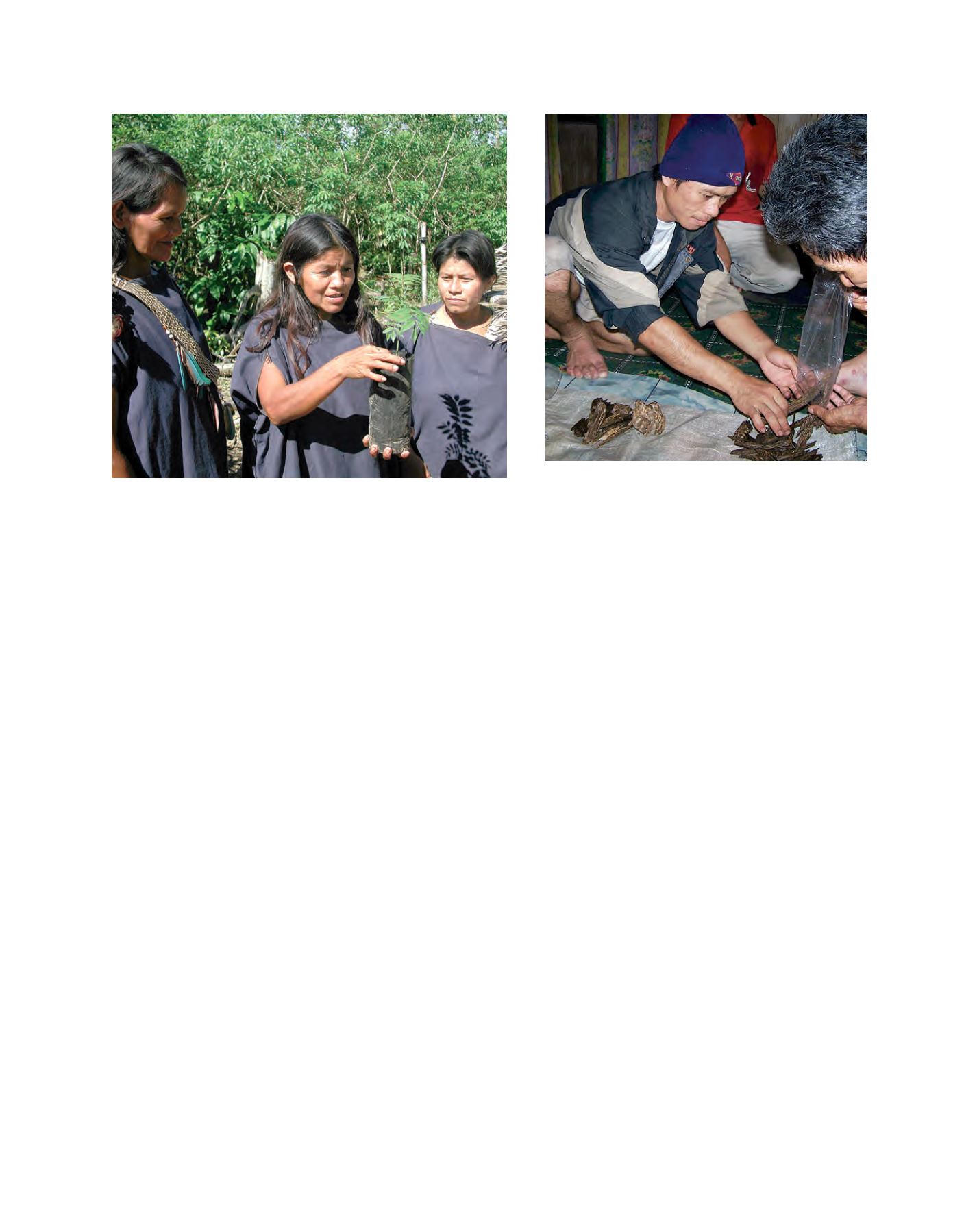

[
] 227
Community-based enterprises are typically insufficiently competitive
as there are major shortcomings in their human, financial and physical
assets. Even in the leading countries only a few CFEs have developed
into medium-sized industrial enterprises, and their capacity to get a fair
price for their products and to invest in value-added activities is low.
Apart fromniche markets, buyers generally tend to prefer suppliers who
can provide reliable deliveries in sufficient quantities. As CFEs typically
lack commercial cooperation and other networks, they cannot enjoy
the economic benefits of scale and specialization, keeping their profit-
ability low. This is coupled with isolation from the market, limitations
in market access due to increasing requirements for verifiable legal and
sustainable product supply and general ignorance of market character-
istics and pricing potential. Trade intermediaries tend to unduly exploit
such situations to reap windfall profits, resulting in an inappropriate
sharing of benefits for CFEs. Support programmes have often failed due
to problems with providing the required economic feasibility assess-
ments for community forest enterprises.
9
Another set of constraints to the development of forest communities,
smallholders and their enterprises can be their limited access to capital
and appropriate technologies. Most rural funding schemes have been
designed for agriculture and only a few countries have targeted financing
schemes for community forestry. This is particularly problematic in fairly
common situations in which the forest areas transferred to community
management are degraded and require significant investment in restora-
tion. Existing credit schemes are not tailored to the need of community
forests for relatively long pay-back periods which are not compatible with
the conditions of regular commercial credit. Financing institutions have
little understanding of the business potential of community forest opera-
tions. Forest growing stock could be used as collateral for financing of
CFEs but this is rarely possible due to lack of relevant regulation and
engagement of the banking sector.
ITTO’s contribution
Since 1992, ITTO has accumulated a significant body of knowl-
edge and experience in the development of community forestry in
its producing member countries. Prior to establish-
ment of the CFME programme, a total of 85 projects
were implemented with an investment of about US$40
million. These projects have had a significant impact
on country and community capacity as revealed by
thematic evaluations.
10
It has been clearly demonstrated
that community forest management and enterprises can
lead to sustained improvements in livelihoods but they
have to be economically feasible, which is one of the
key issues of the CFME Programme.
ITTO has implemented successful community
forestry projects in Bolivia, Ghana, Panama, Peru,
the Philippines and Togo, among others. In addition,
many ITTO projects in the field of reforestation and
forest management have included a focus on creating
economic and other benefits for the local communities
through their participation in project interventions.
ITTO recently completed a series of forest tenure
conferences in the three tropical regions, raising the
profile of this important topic globally. And the CFME
programme (which commenced operations in 2010) is
already funding important country activities in Ghana,
Indonesia, Papua New Guinea and Thailand.
A considerable body of this work has been under-
taken in partnership with other multilateral and
bilateral organizations such as the Food and Agriculture
Organization’s Forestry Department and the Center
for People and Forests (RECOFTC) and in consulta-
tion with the Rights and Resources Initiative (RRI),
the Global Alliance of Community Forestry (GACF)
and the Forest Peoples Program (FPP) of the World
Rainforest Movement. ITTO will continue to work
with its global partners to ensure that communities and
local people achieve their potential to contribute to the
sustainable management of the forests they depend on.
A community forest nursery in Peru
Dayak villagers with harvested forest incense, providing a source of
income to the East Kalimantan economy, Indonesia
Image: Ruben Guevara, ITTO
Image: Gary B. Wetterberg
















